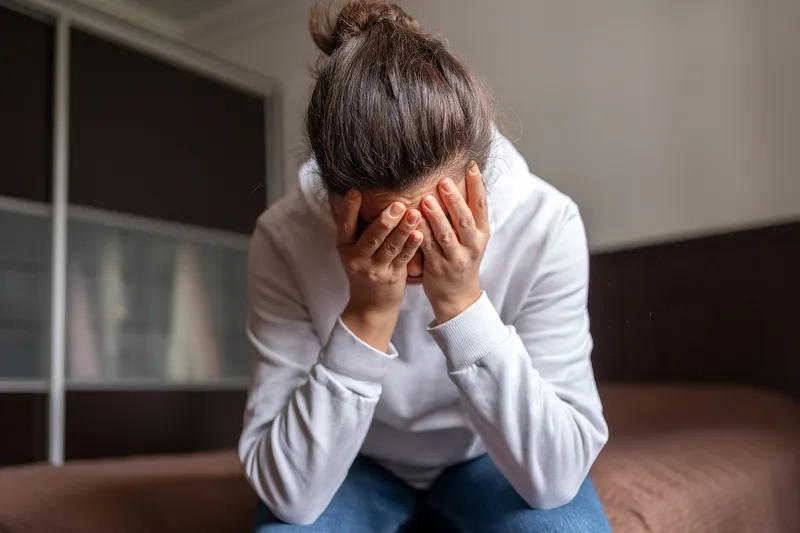
It’s no secret that depression and sleep are strongly connected. Both ends of the spectrum -- sleeping too much or too little -- can impact both your physical and mental health in ways you could never imagine.
One of the most debilitating symptoms of my depression is the constant exhaustion I feel daily. No matter how much or little sleep I get (I get too much at night supplemented by naps during the day), I don’t feel rested. It is a lingering, brutal fatigue that follows me wherever I go, depleting my energy slowly with every social event I attend, every errand I run, every work meeting I have. “I’m so tired,” I seem to text my family and friends weekly. I have not figured out how to bring back my energetic self when I’ve filled up my days with too many commitments.
I’ve always loved sleep. It’s my favorite way to recharge. I’ve seen it as a peaceful respite from the hectic, overwhelming parts of life ever since I could remember. At my lowest, sleep was my safe haven, a place I could fall into where no pain, sadness or anxiety exists. At my highest, my dreams can be magical worlds filled with joy. But during true depressive episodes, they often haven’t been. Instead, they have been dreadful places haunted by my biggest fears and emulating reality so well that I wake up disoriented.
My sleep patterns have been all over the place in the past years of my life living with depression. In college, I would sleep all the time, taking a mid-afternoon nap every day after class. At night, I would sleep soundly but then wake up at 3 a.m. in tears. I was haunted by nightmares so graphic and realistic that I couldn’t comprehend what was real. Nightmares of spiders, robberies, plane crashes, school shootings, and my family and friends dying. Suicidality would even appear in my dreams, making me more distrustful of my thoughts.
I’ve noticed that during my depressive or anxious episodes, nightmares eliminate the safety and comfort that comes with sleep.
Nightmares are not just something that affect you during the night. They can ruin the entire next day or even week. Horrible nightmares would often leave me awake for hours in the middle of the night. I would wake up the next morning feeling the tragedy of my dreams upon opening my eyes. How could my brain attack me so much during the night? How was it coming up with situations that felt so realistic? I would wake up feeling more depressed and exhausted. It never felt like I’d actually slept if I had a nightmare.
My therapist once explained that having severe nightmares was a small form of trauma, and upon regaining consciousness in the morning, it made sense that I felt symptoms closely related to posttraumatic stress disorder or PTSD. With ruined sleep, my sadness and exhaustion intensified, perpetuating my cycle of depression.
The periods of nightmares have decreased dramatically for me in the past 2 years. I have learned to avoid triggers like violent TV or movies before bedtime. When my mind is racing when I’m in bed, I practice deep breathing and mindful visualization. I try to listen to relaxing music or read before bed. And yes, I’m an adult, but I squeeze my stuffed animals when I’m too anxious to fall asleep.
I don’t know what exactly makes the nightmares pop up or disappear. I hope they happen less and less as I get older. But I know that may not be the case.
A good night’s rest or nap is a beautiful thing I don’t take for granted. When I’m asleep too long on weekend mornings, or I go back to bed after breakfast, I often feel guilty. But I’m learning to accept that my depression requires me to need more sleep. I’m learning to be gentle with myself and just take the nap or go to bed early. In a society that pushes ideas of productivity and involves us in constant stimulation, I’ve learned that rest IS productive. It allows me to regain some of the energy I lose throughout the day. It makes me a better employee, a better friend and partner. I can experience life more fully when I am rested. It makes my days brighter, my mind clearer, and life’s moments more cherished. It’s always worth it.
Photo Credit: Charday Penn / iStock via Getty Images Plus
Important:The opinions expressed in WebMD Blogs are solely those of the User, who may or may not have medical or scientific training. These opinions do not represent the opinions of WebMD. Blogs are not reviewed by a WebMD physician or any member of the WebMD editorial staff for accuracy, balance, objectivity, or any other reason except for compliance with our Terms and Conditions. Some of these opinions may contain information about treatments or uses of drug products that have not been approved by the U.S. Food and Drug Administration. WebMD does not endorse any specific product, service or treatment.
Do not consider WebMD Blogs as medical advice. Never delay or disregard seeking professional medical advice from your doctor or other qualified healthcare provider because of something you have read on WebMD. You should always speak with your doctor before you start, stop, or change any prescribed part of your care plan or treatment. WebMD understands that reading individual, real-life experiences can be a helpful resource, but it is never a substitute for professional medical advice, diagnosis, or treatment from a qualified health care provider. If you think you may have a medical emergency, call your doctor or dial 911 immediately.









